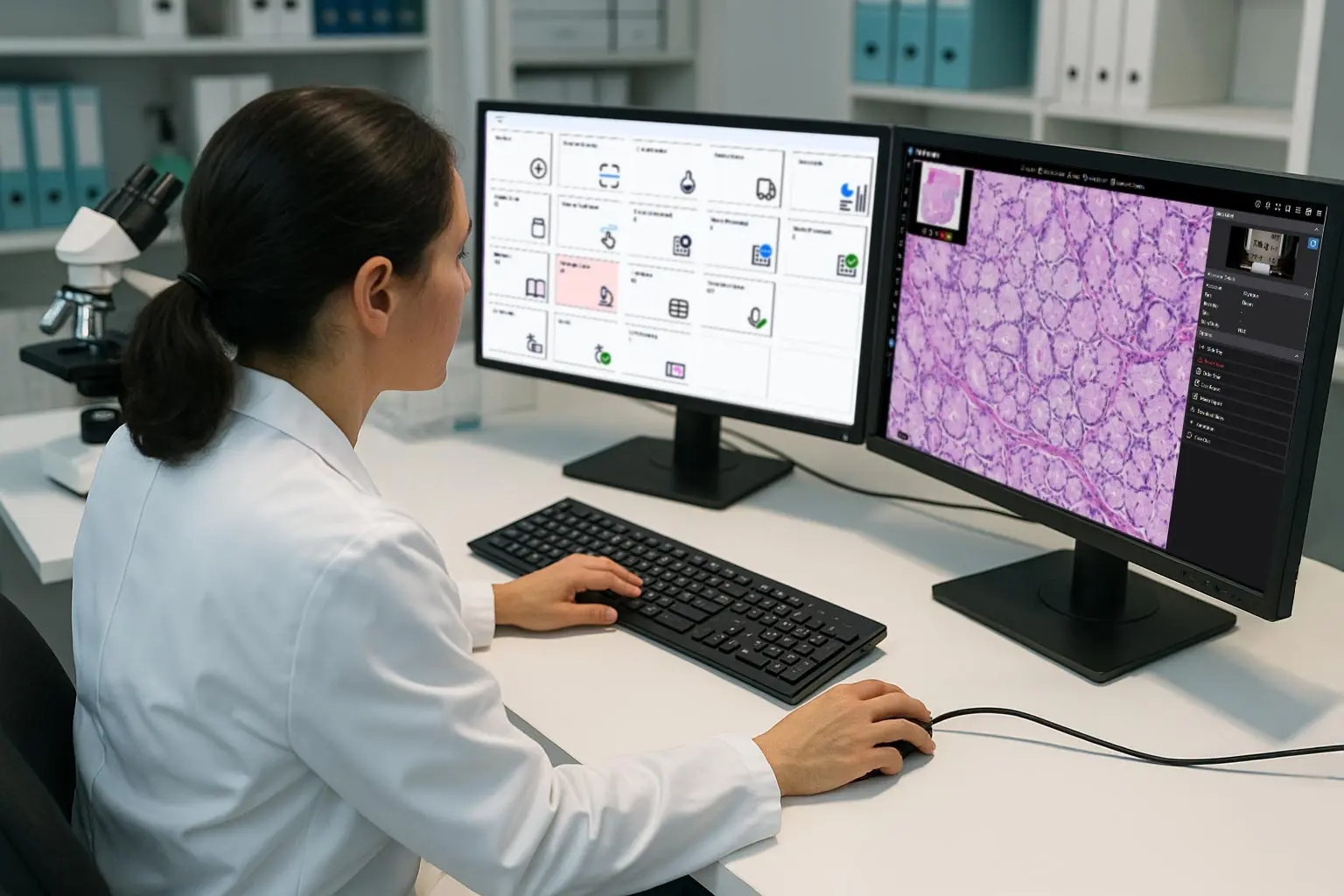Blog
LigoLab’s LIS Software Platform vs. Legacy Laboratory Information Systems: Which Aligns Best with Your Lab's Future?
June 10, 2025
Today’s medical laboratories face a critical crossroads. On one side is the opportunity to embrace modern pathology lab software that streamlines operations, minimizes errors, and drives growth. On the other hand, reliance on outdated laboratory information systems (LIS software) despite inefficiencies, isolated data, and limited flexibility.
Many laboratory professionals face a common struggle: coping with legacy laboratory information system software that no longer meets the complex demands of today’s fast-paced and data-driven environment. These outdated LIS software platforms were once effective, but now serve as barriers to growth, innovation, and streamlined pathology lab management.
Enter LigoLab’s all-in-one medical LIS & lab RCM Laboratory Informatics Platform. Unlike conventional laboratory information system vendors, LigoLab offers an advanced, integrated pathology software solution designed to modernize the way laboratories operate. This article examines how the LigoLab platform compares to traditional LIS systems and why choosing the right pathology lab software has never been more important.
Learn More: What You Need to Know Before Contracting with a Laboratory Information System (LIS) Company
A Modern LIS System That Eliminates the Need for Multiple Tools
LigoLab offers a comprehensive healthcare LIS application that supports clinical, molecular, and anatomic pathology laboratories. It eliminates the need for multiple, disconnected laboratory software systems. With modules that support laboratory revenue cycle management (lab RCM, lab billing), advanced digital pathology solutions, and direct-to-consumer lab testing (TestDirectly and TestDirectly.com), LigoLab provides medical labs a unified LIS software platform designed to streamline operations.
Unlike legacy pathology LIS systems, which often rely on separate databases and infrastructure for different modules, LigoLab uses a shared database architecture. This enables real-time data sharing and reduces costly errors that arise from duplicate data entry or siloed information systems.
Industry Insights: From System of Record to System of Action - The Next Evolution of Laboratory Information Systems

Legacy Laboratory Information Systems: Challenges and Limitations
Traditional LIS systems often come with outdated infrastructure that hinders customization and integration. One of the most common issues is the presence of data silos, which limit a lab’s ability to operate efficiently. Without a unified database, information must be manually transferred or interfaced across departments, increasing the risk of errors and inefficiencies.
Moreover, these legacy LIS software applications lack the flexibility for customization, a critical component of modern clinical laboratory management. They also offer limited automation capabilities and require time-consuming workarounds to complete basic tasks.
Learn More: Stability and Performance: The Two Most Important Aspects of a Modern Laboratory Operation
Transparent LIS System Pricing and Long-Term Value
One of LigoLab’s major advantages is its transparent tiered pricing model. Unlike some LIS system vendors that charge large upfront fees and surprise customers with hidden costs, LigoLab offers subsidized training and implementation along with usage-based pricing, which provides a roadmap for future growth. This allows laboratories to scale as needed without financial strain.
LigoLab also includes unlimited support and regular LIS software updates at no additional cost. This ensures labs always have access to the latest medical LIS features without breaking the budget. In contrast, many legacy LIS systems require separate payments for upgrades, new modules, or even basic support.
Learn More: LigoLab Informatics Platform - Uniquely Designed to Deliver Maximum Value

Continuous Improvement Through CSI and a Dedication to LIS System Excellence
LigoLab’s Continual Service Improvement (CSI) Program sets it apart from traditional pathology software lab vendors. With regular lab workflow evaluations, bottleneck identification, and tailored best practices, the CSI program ensures labs are always running at peak efficiency. This proactive support empowers labs to stay ahead in a competitive and fast-changing healthcare environment.
Modern LIS System Automation and Customization
The LigoLab platform supports intuitive and user-friendly lab information system automation, minimizing manual tasks and reducing the risk of error. Its automation engine is powerful yet easy to use, enabling labs to configure rules without needing extensive technical knowledge.
Legacy LIS systems often require complex rule sets and technical interventions for similar levels of automation. This makes everyday tasks more cumbersome and less efficient, ultimately affecting lab performance and profitability.
White Paper: What To Do When Your Laboratory Information System Is Sunsetting
A User Experience That Boosts Productivity
User navigation is another area where LigoLab excels. Its seamless interface allows users to switch between modules effortlessly, all within the same platform. This enhances clinical laboratory management and reduces the time spent on administrative tasks.
In contrast, many legacy LIS systems are fragmented, requiring users to switch between different platforms for different tasks. This not only wastes time but also increases the risk of data errors.

Superior Sample Tracking and Report Customization
LigoLab’s LIS software supports full specimen traceability by assigning unique identifiers as samples are accessioned. Its case-centric workflow and sample hierarchy design ensure that specimens are managed with precision throughout their lifecycle.
Additionally, LigoLab offers powerful lab report customization features, enabling labs to design reports that align with client preferences. This level of customization is often not possible with legacy LIS systems, which rely on rigid, pre-set templates.
Learn More: How LigoLab's Pathology Lab Software Supports Lab Report Customization and Client Preferences
Robust User Permissions and LIS System Security
Security is a growing concern for pathology lab management. LigoLab addresses this with role-specific user permissions that limit access based on responsibilities. Only designated administrators can delete orders, ensuring greater accountability and data integrity.
Many legacy LIS systems are more permissive, allowing a wider range of users to delete or modify data. This increases the risk of errors and compromises data security.
Learn More: LigoLab’s Enhanced Cybersecurity Solutions Give Customers Added Protection and Peace of Mind
LigoLab’s Multi-Site Support
LigoLab’s platform is built to support laboratories operating across multiple locations. Its LIS system software assigns access based on specific site permissions, ensuring that staff only see the data relevant to their role and location.
Legacy LIS systems, by contrast, often require manual workarounds to manage data across sites, increasing administrative burden and the potential for security lapses.

Role-Based Workflow in Anatomic Pathology LIS Module
LigoLab’s queue-based approach to role management is an intuitive feature highlighted within its anatomic pathology LIS software module. Tasks are automatically assigned based on the user’s role, whether it’s a grossing tech or a pathologist. This clarity in task assignment reduces confusion and boosts lab productivity.
Legacy LIS lab systems often lack this level of support, offering a generic experience that can slow down operations and create workflow bottlenecks.
Learn More: Essential Anatomic Pathology LIS Software Features to Optimize Laboratory Workflow
A Customer-Centric Business Model
LigoLab is a privately owned LIS lab vendor. This allows it to focus entirely on the needs of its customers. Its growth is driven by word-of-mouth referrals and long-term partnerships, rather than aggressive marketing campaigns.
In contrast, many legacy laboratory information system companies are owned by private equity firms, which often prioritize profit over customer satisfaction. This can result in reduced investment in innovation and support services.
Learn More: A Future-Ready Informatics Platform With Unlimited and Unmatched Customer Service

Final Thoughts
LigoLab’s all-in-one informatics platform represents a new generation of laboratory information systems that go beyond traditional functionality. With its comprehensive design, customizable workflows, robust automation, and transparent pricing, the platform delivers a powerful LIS software solution for modern clinical laboratories and pathology groups.
Legacy LIS systems, while foundational, are no longer sufficient for the demands of today’s laboratory environment. Their limitations in data sharing, automation, customization, and support make them increasingly incompatible with the future of pathology lab management.
For laboratories seeking to modernize, streamline, and grow, the choice is clear. LigoLab offers not just a system, but a strategic partnership designed to empower labs for years to come.
To learn more about how LigoLab can transform your lab operations, contact a product specialist today and schedule a personalized LIS software demo.
.jpg)






